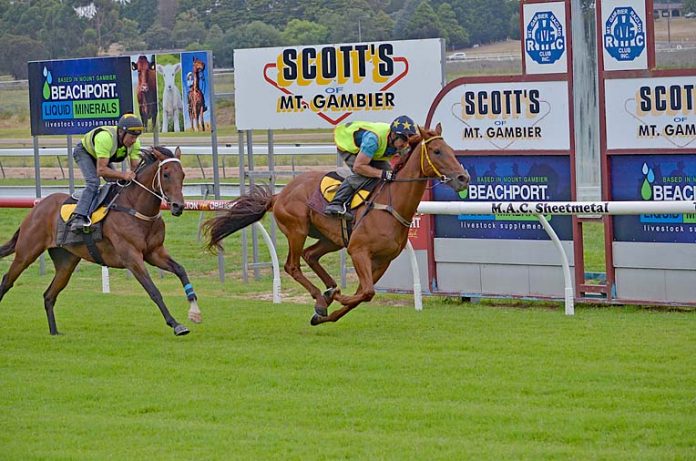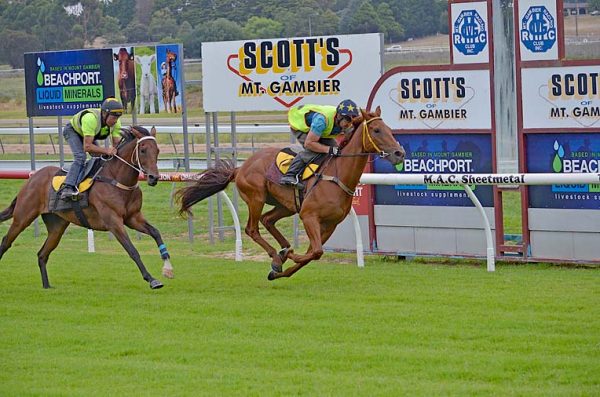

MOUNT Gambier Racing Club has been dealt a double blow amid the redeveloped track continuing to have problems and the impact of the COVID-19 health crisis on the sector.
The new track – which has hosted no racing since the December Gold Cup meeting – recently failed a test when a group of horses galloped over the course in front of Thoroughbred Racing SA officials.
The issue has triggered frustration among regional trainers given a scheduled meeting this Sunday has been transferred to another regional venue.
Ahead of the test, officials were confident the track would be given the green light for racing meetings.
TRSA chief operating officer Vaughn Lynch has called for calm and patience from the industry given it was a fledgling circuit.
He said the track had a number of patches with weed infestation that had infected the root structure of the new grass.
“The track needs deep roots so horses do not dig up large clogs,” Mr Lynch explained.
He said the root structure needed to be secured before a field of 14 horses could race on the circuit.
The industry leader explained he understood the frustration of regional trainers given the continual disruption to the industry.
“We also feel frustrated at TRSA. We really want to see racing return to Mount Gambier,” Mr Lynch said.
But TRSA needed to ensure the track could last through winter.
Mr Lynch revealed repatriation work would start to address the troubled areas of the track which would include spraying the weed infestation and allowing the grass to grow.
While hopeful the condition of the track could recover for the scheduled April meeting, he said it was also important to remain realistic given the need for good rain and sun in coming weeks.
“We want to reassure the community and trainers we are doing everything possible to get horses back racing at Mount Gambier,” the racing chief said.
He revealed it was not uncommon to have teething problems with newly-developed tracks.
“This happens whether it is Flemington or Royal Ascot. Every new track needs time to bed down and grow. A lot of Victorian tracks have had the same issue. The Mount Gambier situation is not unique.”
Mount Gambier Racing Club president John Fartch said the club was also disappointed with the circuit issues.
He said the club was working with the state industry body to address these issues.
Meanwhile, Mr Lynch said the COVID-19 health crisis was also having a significant impact on the state’s thoroughbred sector, similar to many other industries.
He said the majority of the industry relied on “pay-to-pay” and underpinned trainers, jockeys, stable hands and associated industries.
With crowds now not allowed at meetings, Mr Lynch said COVID-19 had rapidly changed the sector.
In a bid to protect jockeys, new rules have been swept in to ensure jockeys would not face penalties for “weighing up”.
Mr Lynch said the industry body did not want to see jockeys’ health put at risk during this COVID-19 health emergency.
He said essential staff at race meetings would also undergo temperature testing before they could come near jockeys.
“We need to do everything we can and follow the advice from federal and statement governments.”
Mr Lynch said the upcoming Penola Cup race day would also be affected with no crowds allowed through the gate.
“It will be a blow for the club, but we are talking with state and federal governments how they can support our industry.”
He foreshadowed trainers would continue to send horses to meetings given the prize-money had not changed.
TRSA chief executive officer Nick Redin said a raft of measures had been introduced to protect the state’s 3600 jobs in the industry and to minimise the chance of a case of COVID-19 affecting racing.
“It is also to protect jockeys, apprentices and track work riders. We simply cannot afford for them to contract COVID-19,” Mr Redin said.
“Should a rider get it and we cannot contain it, it would affect our ability to keep going.”
Racing Victoria suspended racing this week while a licensed participant undergoes a coronavirus test.







